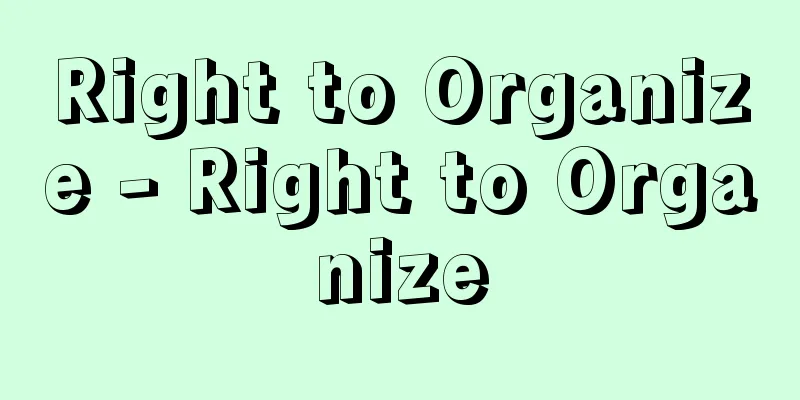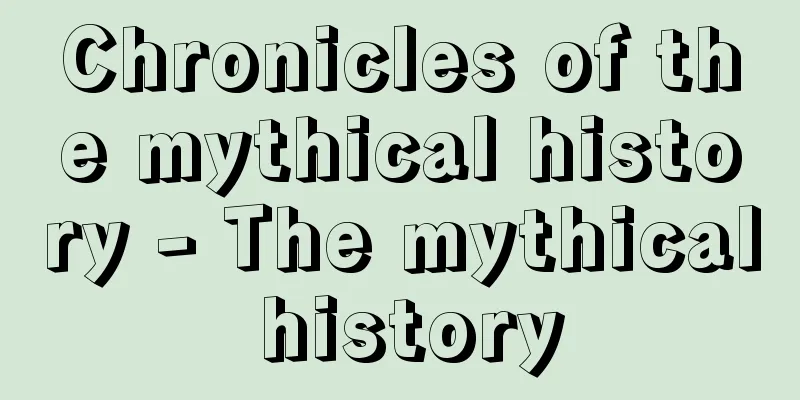Right to Organize - Right to Organize

|
The right of workers to form and manage solidarity groups and engage in solidarity activities. This is a right guaranteed specifically to workers, with the aim of ensuring their human survival by restoring concrete freedom through solidarity. Article 28 of the Constitution of Japan stipulates that workers' "right to organize and to bargain collectively and take other collective action" is guaranteed, and guarantees the right to organize as an independent right distinct from the right to collective bargaining and the right to strike (the right to organize in the narrow sense). However, in light of the actual activities carried out to realize workers' demands, the right to organize should be understood as a set of related dynamic rights, including forming solidarity groups, engaging in solidarity activities, negotiating collectively with employers, and even engaging in strike action in some cases. Historically, the idea of understanding the right to organize in a narrow sense rather than in this broad sense was created in order to isolate and prohibit only the right to strike. Solidarity groups usually take the form of labor unions, but also include temporary ones such as strike groups. In addition, the right to organize is protected by both workers and solidarity groups. The right to organize is protected equally regardless of the number of members. Furthermore, since the right to organize is aimed at guaranteeing the right to live of workers, protection is given not only to problems that can be resolved through collective bargaining with employers, but also to activities that can contribute to improving the social and economic status of workers in general. By the way, since the Constitution guarantees the right to organize separately from "freedom of association" (Article 21), the right to organize is understood to include more than just the freedom of association. Specifically, first, it includes "freedom from the state," and the state cannot, in principle, restrict or prohibit the right to organize or its exercise through legislation or police power. In addition, the legitimate exercise of the right to organize cannot be punished (this is called criminal immunity, and Article 1, Paragraph 2 of the Labor Union Law confirms this). Secondly, employers, who are private individuals, must not interfere with or prohibit the exercise of the right to organize. Therefore, for example, they are prohibited from imposing disadvantages on union activists or interfering in the management of unions. In addition, they cannot claim damages for the legitimate exercise of the right to organize (this is called civil immunity, and Article 8 of the Labor Union Law confirms this for industrial action, but it is allowed for solidarity activities in general). In addition, if the right to organize is violated, workers can receive relief from the courts, but litigation is not suitable for workers in terms of time and cost. Therefore, the Labor Union Law provides for an unfair labor practice system (Articles 7 and 27, etc.), and aims for simple, quick, and appropriate relief by the Labor Relations Commission, an administrative body. Thirdly, in relation to workers, first of all, activities to expand the organization can be carried out outside the union. Specifically, it is permitted to force union members to join the union. However, there have been cases where the union shop agreement, which is a method for this purpose, has been used as a means to exclude minorities within the union from the union rather than to expand unionism, and reexamination of its effectiveness is an issue in order to appropriately harmonize unionism and worker freedom. Furthermore, activities to strengthen the organization can be carried out within the union, such as educational and propaganda activities, and disciplinary measures can be taken against members who disrupt union order. However, this right of control is not unlimited, and it cannot be exercised in a way that violates the freedom of thought and belief of union members. In Japan, although they are all workers, members of the Self-Defense Forces, police officers, firefighters, Japan Coast Guard officials, and penal institution staff are denied the right to organize under their respective relevant laws and regulations and are therefore unable to form unions. [Mikio Yoshida] "A Study of the Idea of the Right to Organize" by Numata Inejiro (1972, Keiso Shobo)" ▽ "The Collected Works of Numata Inejiro 3: The Right to Organize" (1976, Labor Junposha) ▽ "The Collected Works of Nomura Heiji 2: The Right to Organize and Union Activities" (1978, Labor Junposha) [References] | | | | |Source: Shogakukan Encyclopedia Nipponica About Encyclopedia Nipponica Information | Legend |
|
労働者が団結体を結成・運営し、団結活動を行う権利。これは、労働者が団結を通じて具体的な自由を回復することにより、その人間的な生存を確保することをねらいとして、とくに労働者に対してのみ保障された権利である。日本国憲法第28条では、労働者の「団結する権利及び団体交渉その他の団体行動をする権利」を保障すると規定し、団体交渉権や争議権とは区別された独立の権利として団結権を保障している(狭義の団結権)。しかし、労働者の諸要求実現のための活動の実態からすると、団結権は、団結体を結成し、団結活動を行い、使用者と団体交渉し、場合によっては争議行為も行うという一連の関連しあった動的な権利の総体としてとらえるべきである。団結権概念をこうした広義の意味ではなく狭義に理解する考え方は、歴史的には争議権のみを取り出して禁止するために生み出されたといえる。団結体は通常は労働組合という形態をとるが、争議団のような一時的なものも含む。また、団結権の保護は労働者と団結体の両方が受ける。団結体はその構成員の数に関係なく平等に保護を受ける。さらに、団結権は労働者の生存権保障をねらいとするものであるから、単に使用者との団体交渉を通じて解決しうる問題に限らず、広く労働者の社会的・経済的地位の向上に役だちうるような活動が保護を受ける。 ところで、憲法は「結社の自由」(21条)とは別に団結権を保障していることから、団結権は結社の自由以上の内容を含むものと理解されている。具体的には、第一に、「国家からの自由」を含み、国家は原則として立法や警察力により団結権およびその行使を制限したり禁止できない。また、正当な団結権の行使は処罰されない(これを刑事免責といい、労働組合法1条2項はこのことを確認している)。第二に、私人である使用者も団結権の行使を妨害したり禁止してはならない。したがって、たとえば組合活動家に不利益を課すとか、組合の運営に介入するという行為は禁止される。また、正当な団結権の行使に対して損害賠償の請求をすることはできない(これを民事免責といい、労働組合法8条は争議行為についてこのことを確認しているが、団結活動一般について認められる)。なお、団結権が侵害された場合には、裁判所の救済を受けることができるが、訴訟という方法は時間と費用の点で労働者には不適切である。そこで、労働組合法で不当労働行為制度を設け(7条・27条など)、行政機関である労働委員会による簡易・迅速で適切な救済が企図されている。第三に、労働者との関係では、まず団結の外部に対して組織拡大の活動ができる。具体的には団結加入を強制することが認められる。しかし、そのための方法であるユニオン・ショップ協定が団結の拡大のためより組合内少数派を組合から排除するための手段として利用される例がみられることもあって、団結体と労働者の自由の適切な調和のために、その有効性の再検討が問題となっている。また、団結の内部に対しては組織強化のための活動ができ、教育・宣伝活動や、団結秩序を乱した構成員に対する統制処分ができる。しかし、この統制権も無制限ではなく、組合員の思想・信条の自由を犯すことになる行使はできない。 なお、日本では、労働者でありながら、自衛隊員、警察職員、消防職員、海上保安庁職員、刑事施設職員は、それぞれの関係法令で団結権が否定され、組合結成ができない。 [吉田美喜夫] 『沼田稲次郎著『団結権思想の研究』(1972・勁草書房)』▽『『沼田稲次郎著作集3 団結権論』(1976・労働旬報社)』▽『『野村平爾著作集2 団結権と組合活動』(1978・労働旬報社)』 [参照項目] | | | | |出典 小学館 日本大百科全書(ニッポニカ)日本大百科全書(ニッポニカ)について 情報 | 凡例 |
Recommend
King, BB (English spelling) KingBB
...guitar), Robert Johnson (1912?-38, guitar), a ...
Victor Griffuelhes
1874‐1922 A French labor movement leader. He joine...
tetany
… [Parathyroid Abnormalities] Abnormalities in th...
Eid Frith - Eid Frith
…It measures 34cm x 25cm and has 659 leaves. Acco...
Kanehiro Takagi
A naval doctor in the Meiji and Taisho periods. A...
School nurse
...According to the provisions of the School Educ...
Pheasant Fern - Pheasant Fern
An evergreen fern of the family Lycopodium (illust...
Livestock Inspection - Kachikushinsa
The process of determining the economic value of i...
Vacuum distillation
Distillation under reduced pressure. Generally, th...
Cladophora (Cladgrass) - Cladophora
A genus of green algae in the Cladophoraceae famil...
Nagashimaso - Nagashima no Sho
This manor was owned by Kyoto Rengeo-in Temple in ...
Ichiura Kengyo
A blind jiuta and sokyoku performer in the Edo per...
Noto Kongo
A scenic spot on the west coast of the Noto Penin...
Perseus
Hero of Greek mythology. King Acrisius of Argos im...
Mikawa Bay
An inland bay in the southern part of Aichi Prefe...
![Kaminaka [town] - Kaminaka](/upload/images/67cb3f4589265.webp)








